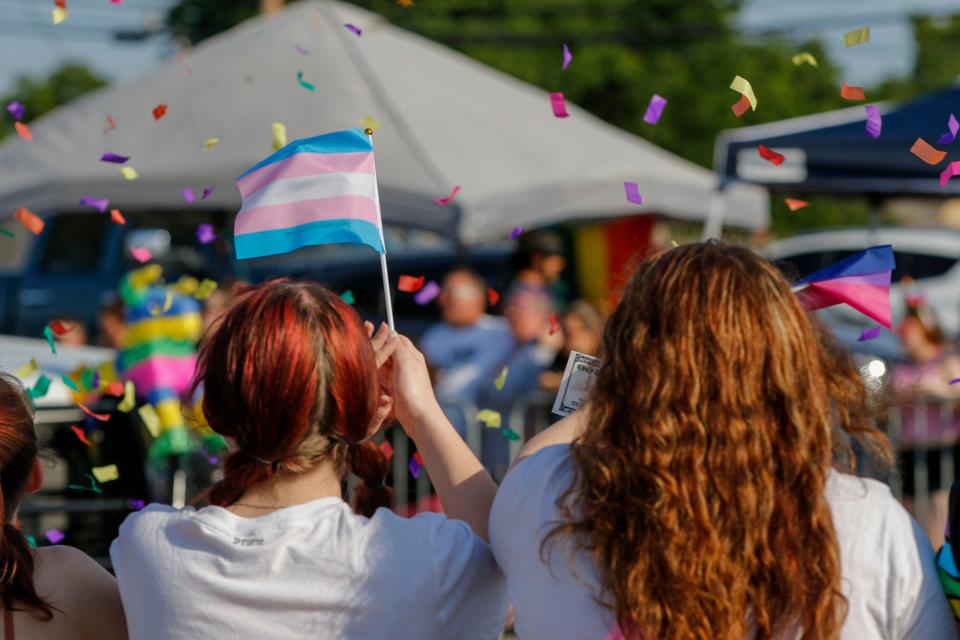Personal experience builds understanding about transgender individuals
- Oops!Something went wrong.Please try again later.
We recently received an email from friends informing us that their son (who I’ll call Andy) revealed that, for several years, they had been experiencing gender dysmorphia —persistent distress caused by a mismatch between their biological sex at birth and gender with which they identity.
Andy had come to the conclusion that they were transgender and was now going by the name of Addie. The email acknowledged this news might come as a surprise and might cause feelings of discomfort. We were somewhat surprised, but the only feelings of discomfort we had were related to the reactions Addie and the family might experience.
Our first thought was, “Thank God they don’t live in Florida."
More from Greg McGann:
Even when they're not right, too many people looking for a fight
'The 1619 Project' shows how the legacy of slavery continues to keep us divided
National Social Work Month brings attention to help provided by profession
A few days later we received an invitation to Addie’s high school graduation. The invite included a photo of Addie in a bright pink dress. The shoulder-length hair and manicured nails were new as was the broad smile.
As a youngster I recall Andy’s shy grin, with barely parted lips. In these photos Addie’s smile was full and open, with perfect teeth and a decidedly relaxed countenance. It was a look of true happiness.
Like most, my exposure to the world of boys who feel they are biologically girls, and girls who have the insistent belief that they are really boys, is limited. Much of what I think I know has resulted from the publicity about shaming, stigmatizing and discriminating against trans individuals.

Andy’s transformation to Addie helped crystallize the issue in a way that added personal relevance. Like learning a foreign language, I’ve been researching definitions and striving to incorporate respectful pronouns.
On any number of social issues — decriminalizing marijuana, acceptance of gay individuals, acknowledging mankind’s role in climate change — Americans’ opinions have evolved from knee-jerk denial and disapproval to understanding and acceptance as issues are demystified over time. For many, increased tolerance comes after a personal encounter. As more people try cannabis, realize a friend has hidden their sexual orientation for fear of being ostracized or experience record heatwaves, storms or flooding, reactive attitudes about once abstract issues begin to mature.
This level of acceptance may be a long time coming for transgender individuals. Though they are more in the news recently, the percentage of Americans who identify as trans is barely one half of 1%, though a recent survey found the percentage of young people who ID as trans or non-binary may be as high as 5%. Like other anomalies related to human sexuality, these changes warrant deeper study but the uniqueness of transgender individuals makes them easy marks for bullying and discrimination.
This year has seen over 300 anti-LGBT bills introduced in state legislatures. In Florida, Ron DeSantis is bringing the full power of state government to discriminate against transgendered individuals. That makes it incumbent for the rest of us to stand up for them, for though their numbers are small, the bigotry they face is enormous and the consequences dire — the rate of suicide for gender dysmorphic youth is 12 times that of their peers.
Our friends live in a state far more politically tolerant than Florida. Here, if Addie had questions about their sexuality growing up, and went to a trusted teacher, that teacher could face lawsuits, harassment from vigilantes or dismissal for broaching the subject.
As a recent article by a parent put it, “The hardest part of having a non-binary kid is other people.” Especially when those other people are in positions to mandate real harm.
Greg McGann is a licensed clinical social worker who lives in Gainesville.
Join the conversation
Share your opinions by sending a letter to the editor (up to 200 words) to letters@gainesville.com. Letters must include the writer's full name and city of residence. Additional guidelines for submitting letters and longer guest columns can be found at bit.ly/sunopinionguidelines.
Journalism matters. Your support matters.
Get a digital subscription to the Gainesville Sun. Includes must-see content on Gainesville.com and Gatorsports.com, breaking news and updates on all your devices, and access to the eEdition. Visit www.gainesville.com/subscribenow to sign up.
This article originally appeared on The Gainesville Sun: Greg McGann: Experience with transgender people builds understanding

